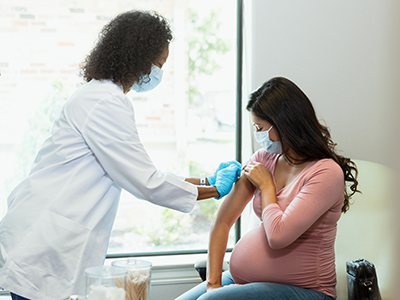You are here
Do pregnant moms still need the COVID-19 vaccine in 2025?
The short answer is YES. The scientific evidence for getting vaccinated during pregnancy has not changed, regardless of what anti-vaccine politicians are saying. To read a full summary of this topic, you should check out the blog, Your Local Epidemiologist, that is written by Katelyn Jetelina, MPH PhD, of Yale University. We are just summarizing her key points here to make sure that this information is seen by expectant moms.
Getting the COVID-19 vaccine during pregnancy is a two for the price of one protection, because it protects both the mother and the baby. The mother needs the COVID-19 vaccine because pregnant people are at higher risk for serious complications if they get the COVID-19 virus. In addition, since anti-bodies cross the placenta, the baby will also pick up protection from the vaccine, and the immunity that the baby receives from mom lasts until about age six months.
 The COVID-19 vaccine is even more important for the baby than for the mom. Within the US, the CDC currently reports that infants are the age group that is most likely to go to the emergency room due to COVID-19. It is well known that the elderly are the most vulnerable to COVID-19, but many elderly people have had a few vaccines by now, whereas infants are more likely to be unprotected. The CDC data shows that less than 5% of children and adolescents hospitalized with COVID-19 in the US had received the most recently recommended COVID-19 vaccination. Among infants ages 6 to 23 months hospitalized with COVID-19, the most common underlying condition was prematurity.
The COVID-19 vaccine is even more important for the baby than for the mom. Within the US, the CDC currently reports that infants are the age group that is most likely to go to the emergency room due to COVID-19. It is well known that the elderly are the most vulnerable to COVID-19, but many elderly people have had a few vaccines by now, whereas infants are more likely to be unprotected. The CDC data shows that less than 5% of children and adolescents hospitalized with COVID-19 in the US had received the most recently recommended COVID-19 vaccination. Among infants ages 6 to 23 months hospitalized with COVID-19, the most common underlying condition was prematurity.
A study of 1.8 million expectant moms who received the COVID-19 vaccine found no increased risk of bad outcomes for the mother or baby, while the risk of hospitalization for COVID-19 was reduced by 94%, preeclampsia was reduced 12%, C-sections were reduced 9%, and babies were 8% less likely to spend time in the NICU.
Right now (9 July 2025), the official guidance from the US government says that COVID-19 vaccination of children (minimum age 6 months) should be based on “shared clinical decision-making”. This means that the decision is the shared responsibility of the parent in consultation with the child’s healthcare provider. The fact that the CDC has transitioned from a blanket statement of “eligibility” to a policy of “shared decision making” makes it easier for parents to choose not to vaccinate, and it also make it easier for insurance companies to choose not to cover vaccination.
Health policies in the United States are currently susceptible to change without notice. But the scientific evidence in favor of getting a COVID-19 vaccine during pregnancy has not changed.


